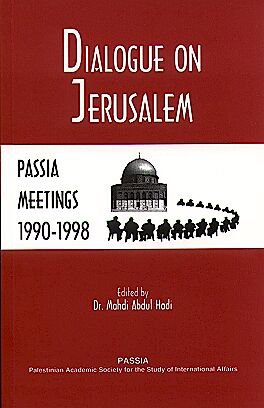Dialogue on Jerusalem - PASSIA Meetings 1990-1998, edited by Dr. Mahdi Abdul Hadi. Jerusalem: PASSIA
This book is a summary of selected meetings on the subject of Jerusalem
held at PASSIA during the years 1990-1998. The publication serves as a
general reader on the numerous aspects and viewpoints that make up the
Question of Jerusalem, whilst giving all those interested an insight into the
ongoing debate on the fate and future of the city.
Overview
The conflict over the status of Jerusalem is often cited as the most sensitive, central and emotive of the conflicts shaking the Middle East region as a whole. While discussion in the current peace process as to the Holy City's future has been postponed at Israel's insistence, Palestinians in
the annexed city continue to suffer the daily abuse of occupation. Israeli discriminatory practices and measures against the Palestinian population of the city include building and residency restrictions,
the denial of access to the city and its holy sites, unfair taxation, the seizing of land, the demolition of houses, the confiscation of ID cards (thus, denial of residency rights), and the closing down of institutions, to name but a few.
Since its establishment, PASSIA has provided a forum for dialogue and the free expression and analysis of a plurality of Palestinian perspectives and approaches. In setting up its annual Meeting Program PASSIA has always put special emphasis on the Question of Jerusalem and has regularly hosted workshops and roundtable discussions on the various aspects of and perspectives on the city and its future.
Over the years, PASSIA’s Dialogue on Jerusalem has stimulated discussion on the many issues of the Question of Jerusalem with people of all kind of backgrounds being invited to give presentations and encourage debate on the issues in questions. These people included local and foreign scholars and intellectuals, representatives from the three monotheistic religions, members of all Palestinian political factions and schools of thought, Israeli academics and political figures, representatives from the diplomatic corps, and visiting scholars from Europe, the US and elsewhere.
Whilst planning such meetings, it has always been PASSIA’s intention to facilitate the exchange of information and the identification of needs and interests in the city, and to encourage the development of possible future scenarios. The broad range of topics discussed included infrastructure, demographic and geopolitical issues, settlements and land use, human rights, ‘absentee property’, the Old City, religion and religious affiliation with the city, Israeli institutions, Israeli municipal elections, and future scenarios for the status of the city.
Being located in East Jerusalem, PASSIA is very much aware of and subject to the Israeli policies and practices pertaining to this part of the city and its Palestinian inhabitants. In addition, PASSIA experiences first-hand the effects of the Israeli occupation and closure as well as the impact both have on the activities of the city's Palestinian institutions, the life of the people, and their relations with the rest of the Palestinian territories. In recent years PASSIA’s roundtable discussions have been greatly curtailed by the Israeli closure of Jerusalem, which prevents Palestinians from the West Bank and Gaza Strip from attending meetings and other events in the city. Nevertheless, PASSIA's activities in connection to the Question of Jerusalem remain a priority and PASSIA continues to strive to raise awareness of and disseminate information on the situation in the city through academic research, the publication of studies, the hosting of meetings, cooperation with other institutions, and participation in international and local conferences.
What follows is a summary of meetings on the subject of Jerusalem held at PASSIA from 1990-1998. Owing to limitations of space it is not possible to include all the smaller meetings and briefing sessions that took place with visiting local and international diplomatic and religious representatives or scholars and researchers from around the world, nor all the discussions that followed the presentations. PASSIA thus took the liberty of selecting what it deemed most significant whilst trying to keep the scope and content as comprehensive and informative as possible. The ultimate goal of this publication is therefore to serve as a general reader on the numerous aspects and viewpoints that make up the Question of Jerusalem, whilst giving all those interested an insight into the ongoing debate on the fate and future of the city.
Jerusalem, October 1998
Dr. Mahdi Abdul Hadi
Head of PASSIA

